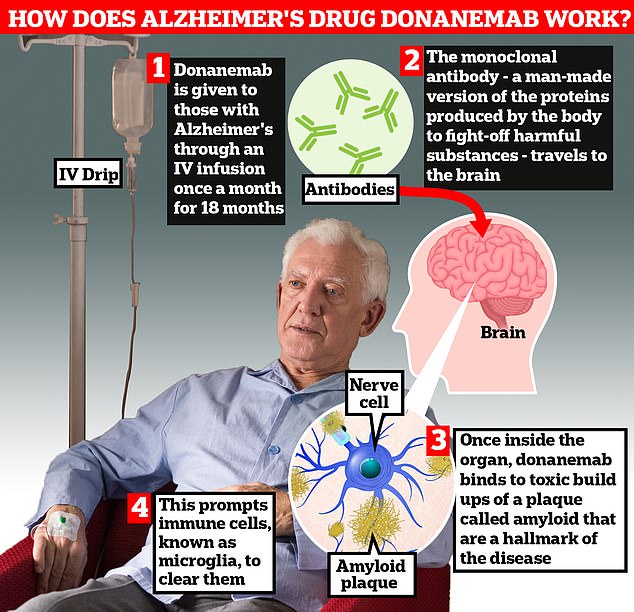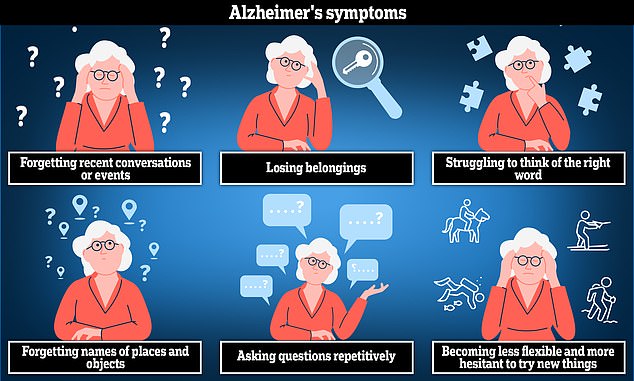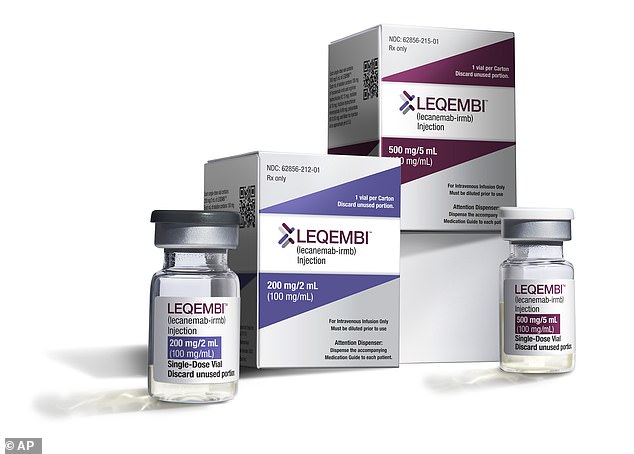More than 80 per cent of Britons at risk of Alzheimer’s could miss out on revolutionary new drugs to treat the incurable disease, experts warned today.
Donanemab and lecanemab have been shown to slow the progression of this memory-robbing disease in its early stages.
They are expected to be approved for use by the NHS later this year, and each of them has already been given the green light in the US.
But a lack of adequate Alzheimer’s testing at scale means the health service risks being “overwhelmed” by demand for two new drugs, researchers argued.
Instead, the London scientists estimated that only 14 percent of patients referred to clinics were actually likely to benefit from the treatments.
The two drugs have been shown in trials to slow the progression of the disease by up to 60 percent by helping to clear the buildup of amyloid protein in the brain.
Experts have long believed they could herald a new era in dementia treatment by addressing the cause rather than simply easing the symptoms.
Currently, the only medications available for Alzheimer’s are to treat the symptoms.
The researchers, from University College London (UCL) and Queen Mary University of London, examined clinical notes from 1,017 NHS patients in the city, including 517 patients assessed in memory services and 500 in a specialist cognitive service.
Just under two-thirds (62 percent) of patients in specialty clinics received the necessary fluid biomarker testing.
Once they took into account those who would not be eligible for the treatments due to frailty and other problems, they found that four in ten were potentially eligible for treatment with the new drugs.
The scientists said this amounted to just 14 per cent of all cases (or one in seven) reviewed in specialist cognitive clinics.
In comparison, only a third (32 percent) of patients in memory services were likely to be referred as potential candidates for the medications.
Almost all had brain scans, but only two patients had lumbar punctures, which confirm whether a patient had amyloid and tau proteins, associated with Alzheimer’s.
writing in the Journal of Neurology, Neurosurgery and PsychiatryResearchers said there was a “clear and urgent” need to improve NHS screening to determine who might benefit from new Alzheimer’s drugs.
Health service systems “Measures need to be put in place to address this large potential mismatch between referral and final eligibility to avoid overwhelming services,” they added.
In April, it was revealed that around 5,000 Britons could have cheap blood tests to detect Alzheimer’s in an effort to revolutionize the NHS’s “shocking” diagnosis rates.
In two landmark trials, researchers from Oxford and University College London will use tests to detect proteins in the blood linked to the disease.
At the time, researchers said they hoped the “innovative” blood test, which costs around £100, could speed up the process, allowing patients to receive treatment sooner.
The trials, which are expected to cost around £10 million, will be carried out across the UK and will be carried out with people who have reported symptoms to their GP and who may be in the early stages of dementia.
David Thomas, head of policy and public affairs at Alzheimer’s Research UK, said today that cheaper and scalable diagnostics such as blood tests are urgently needed.
He said: “There are finally new Alzheimer’s drugs on the horizon, but for their full potential to be realized, health systems must be able to offer people with symptoms of dementia an accurate and early diagnosis to find out whether these treatments could benefit them.”
‘As this research shows, the NHS is a long way from being able to carry out these tests routinely.
“Whoever forms the next government must urgently invest in the NHS, to ensure we have the right diagnostics and workforce to help identify people who could benefit from new treatments should regulators deem them safe and effective.”
A report published earlier this year by the National Health Service in England stated that “timely diagnosis of dementia is vital”, adding that new blood tests could soon replace lumbar punctures in diagnosing the disease.
It predicts that the number of patients who could be eligible for the drugs ranges between 50,000 and 280,000, with an estimated cost of £500 million to £1 billion a year.
However, actual costs will depend on drug prices agreed for England.
The document said: “To be eligible for treatment, patients will need an initial MRI and then a PET-CT scan or lumbar puncture confirming the presence of beta-amyloid proteins in the brain, which are associated with Alzheimer’s.” . disease process.’
Dr Alex Osborne, policy director at the Alzheimer’s Society, said: “These drugs are only available to people in the early stages of Alzheimer’s disease, and more than a third of the 982,000 people living with dementia in the “The United Kingdom does not have a diagnosis.” absolutely.
“That’s why Alzheimer’s Society is calling on the NHS to publish plans for how it will bring innovative new treatments to people who need them, with a specific focus on diagnosis and investment in the tools and workforce needed to identify eligible patients.
Around 944,000 people in the UK are thought to be living with dementia, while in the US the figure is around 7 million.
Alzheimer’s affects approximately six in 10 people with dementia.
It is believed to be caused by a buildup of amyloid and tau in the brain, which build up and build up of plaques and tangles that make it difficult for the brain to function properly.
Over time, the brain struggles to cope with this damage and symptoms of dementia develop.
Memory problems, thinking and reasoning difficulties, and language problems are common early symptoms of the condition, which then worsen over time.
Dementia is expected to skyrocket in the coming years, so a cheap screening tool is vital to meeting the challenge.
Analysis by Alzheimer’s Research UK found that 74,261 people died from dementia in 2022, compared to 69,178 the previous year, making it the leading cause of death in the country.
Donanemab and lecanemab (pictured) have been shown to slow the progression of this memory-robbing disease in its early stages. They are expected to be approved for use by the NHS later this year, and each of them has already been given the green light in the US.

The two drugs have been shown in trials to slow the progression of the disease by up to 60 percent by helping to clear the buildup of amyloid protein in the brain. Experts have long believed they could herald a new era in dementia treatment by addressing the cause rather than simply easing the symptoms.

Alzheimer’s disease is the most common cause of dementia. The disease can cause anxiety, confusion and short-term memory loss.


